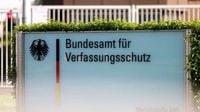In a significant development on May 8, 2025, the Bundesamt für Verfassungsschutz (BfV), Germany's domestic intelligence agency, announced a temporary standstill agreement (Stillhaltezusage) in its ongoing legal dispute with the Alternative for Germany party (AfD). This decision means that the BfV will not classify or publicly refer to the AfD as "gesichert rechtsextremistisch" (assuredly right-wing extremist) until a court ruling is made regarding the party's urgent application.
The Administrative Court of Cologne (Verwaltungsgericht Köln) confirmed in a press release that the BfV's classification of the AfD as a "gesichert rechtsextremistische Bestrebung" (assuredly right-wing extremist endeavor) would be suspended pending the court's decision. Furthermore, the BfV stated it would remove its press release from May 2, 2025, which had announced the new classification, from its website.
This latest action follows a decision by the BfV last Friday, which classified the AfD as a right-wing extremist party, citing a "die Menschenwürde missachtende, extremistische Prägung der Gesamtpartei" (an extremist character of the entire party that disregards human dignity). This classification represented a significant upgrade from the previous designation as a suspected case (Verdachtsfall), which had allowed for surveillance and the use of informants but at a different threshold of proof.
The AfD reacted swiftly to the BfV's classification, issuing a warning to the agency and demanding a cease-and-desist declaration by the following Monday morning. When the BfV did not comply, the AfD filed a lawsuit and an urgent application with the Cologne court to review the classification. The party requested that the court order the BfV to issue a Stillhaltezusage, effectively halting any further public declarations of the AfD's classification until the court reached a decision.
In legal terms, the AfD's request for a "Hängebeschluss" (suspensory order) aimed to freeze the BfV's classification until the court could assess the legality of the agency's actions. The court's decision would not consider the likelihood of success for the AfD's urgent application but would weigh the potential harms to both the BfV and the AfD during the interim period.
Legal experts suggested that the BfV's decision to issue a Stillhaltezusage was a strategic move to avoid potential embarrassment in court. By agreeing not to classify the AfD as "gesichert rechtsextremistisch" publicly, the BfV could sidestep a situation where a court might rule against it, which could have negative public relations implications.
While the Stillhaltezusage temporarily alleviates some pressure on the AfD, it does not eliminate the scrutiny the party faces. The BfV's internal assessment remains unchanged, and the AfD will continue to be monitored as a suspected case, allowing for the possibility of surveillance and other intelligence measures, albeit with elevated thresholds for such actions.
Calls for the dismissal of civil servants affiliated with the AfD have intensified, particularly in light of the party's new classification. The BfV's classification as "gesichert rechtsextrem" had raised concerns about the appropriateness of having civil servants who are also AfD members in public service roles.
The recent classification came shortly before the end of Nancy Faeser's term as Federal Minister of the Interior. Faeser, a member of the Social Democratic Party (SPD), emphasized that the BfV's new assessment reached her ministry only on April 28, 2025, and insisted she had no influence over the agency's decision-making process.
The BfV's classification was based on an extensive report that included more than 1,000 pages of analysis, citing a pattern of xenophobic statements from party members, including remarks such as, "Every foreigner in this country is one too many." This report underscored the entrenched xenophobic attitudes within the AfD's leadership structure.
In response to the BfV's actions, AfD leaders Tino Chrupalla and Alice Weidel expressed optimism, framing the standstill agreement as a crucial step toward addressing the allegations of right-wing extremism. They stated, "This is an important first step toward our actual exoneration and addressing the accusations of extremism. We will continue to fight against this unjustified defamation of the AfD using all legal means available to us."
The BfV's standstill agreement is not unprecedented; the agency had previously issued similar agreements in 2021 when the AfD contested its classification as a suspected case. However, this current situation is particularly notable given the heightened scrutiny and political ramifications surrounding the AfD's activities and public perception.
As the legal proceedings unfold, the implications of the BfV's classification and the AfD's response will continue to shape the political landscape in Germany. The case highlights the ongoing tensions between state security measures and political freedoms, as well as the challenges faced by political parties operating within a contentious environment.
The court's decision on the AfD's urgent application is awaited with bated breath, as it will likely have far-reaching consequences for the party's future and its standing within German politics. With both sides preparing for a long legal battle, the outcome remains uncertain, but one thing is clear: the scrutiny of the AfD is far from over.





